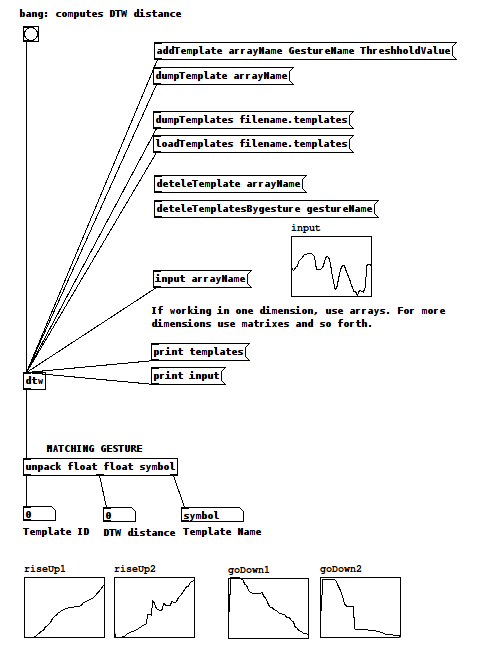PedroLopes (talk | contribs) No edit summary |
PedroLopes (talk | contribs) mNo edit summary |
||
| Line 2: | Line 2: | ||
Authors: '''[http://pedrolopesresearch.wordpress.com Pedro Lopes]''' and ''Joaquim Jorge''' | Authors: '''[http://pedrolopesresearch.wordpress.com Pedro Lopes]''' and ''Joaquim Jorge''' | ||
[[ | [[File:Dtw_help.png]] | ||
We present an implementation of the Dynamic Time Warping algorithm for the [[Pure Data]] programming environment. This algorithm is fairly popular in several contexts, ranging from speech processing to pattern detection, mainly because it allows to compare and recognize data sets that may vary non-linearly in time. | We present an implementation of the Dynamic Time Warping algorithm for the [[Pure Data]] programming environment. This algorithm is fairly popular in several contexts, ranging from speech processing to pattern detection, mainly because it allows to compare and recognize data sets that may vary non-linearly in time. | ||
Revision as of 17:54, 2 July 2011
Dynamic time warping for Pure Data
Authors: Pedro Lopes' and Joaquim Jorge
We present an implementation of the Dynamic Time Warping algorithm for the Pure Data programming environment. This algorithm is fairly popular in several contexts, ranging from speech processing to pattern detection, mainly because it allows to compare and recognize data sets that may vary non-linearly in time. Our contribution is easily portable to a wide number of platforms, where Pure Data is available. Throughout this document we describe relevant work that inspired our proposal and present the core concepts of our implementation.
We conclude with an evaluation of our Dynamic Time Warping implementation in two perspectives: performance and adequacy towards gesture recognition. The performance tests suggest that it is suited for realtime contexts, where algorithmic efficiency is of utmost importance. Finally we present a case study where our implementation was used successfully to accommodate gesture recognition on an existing application.
